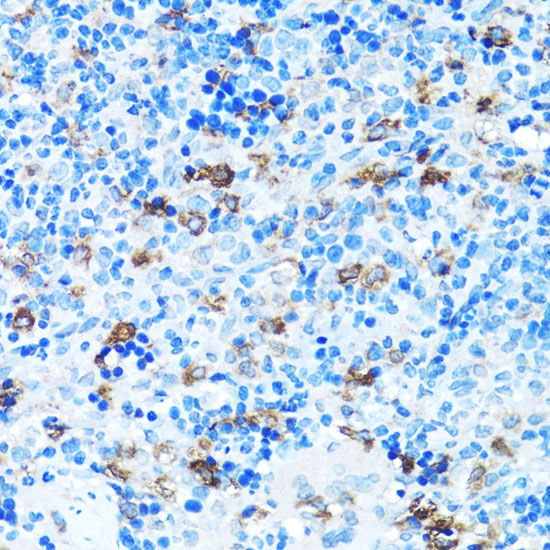Product Detail
Product NameFGFR2 Antibody
Host SpeciesRabbit
ClonalityPolyclonal
PurificationAntibodies were purified by affinity purification using immunogen.
ApplicationsIHC
Species ReactivityHuman,Mouse,Rat
SpecificityThe antibody detects endogenous level of total FGFR2 protein.
Immunogen TypePeptide
Immunogen DescA synthetic peptide of human FGFR2.
Target NameFGFR2
ConjugateUnconjugated
Other NamesBEK; BFR-1; CD332; CEK3; CFD1
Accession NoSwiss-Prot:P21802
NCBI Gene ID:2263
Uniprot
P21802
Gene ID
2263;
Sdspage MW79KD
Concentration1.0mg/ml
FormulationSupplied at 1.0mg/mL in phosphate buffered saline (without Mg2+ and Ca2+), pH 7.4, 150mM NaCl, 0.02% sodium azide and 50% glycerol.
StorageStore at -20˚C
Application Details
IHC 1:50 - 1:200
Immunohistochemistry of paraffin-embedded rat spleen using FGFR2 at dilution of 1:100 (40x lens).
Immunohistochemistry of paraffin-embedded human placenta using FGFR2 at dilution of 1:100 (40x lens).
Immunohistochemistry of paraffin-embedded mouse heart using FGFR2 at dilution of 1:100 (40x lens).
Fibroblast growth factors (FGFs) produce mitogenic and angiogenic effects in target cells by signaling through cell surface receptor tyrosine kinases. There are four members of the FGF receptor family: FGFR1 (flg), FGFR2 (bek, KGFR), FGFR3, and FGFR4. Each receptor contains an extracellular ligand binding domain, a transmembrane domain, and a cytoplasmic kinase domain (1). Following ligand binding and dimerization, the receptors are phosphorylated at specific tyrosine residues (2). Seven tyrosine residues in the cytoplasmic tail of FGFR1 can be phosphorylated: Tyr463, 583, 585, 653, 654, 730, and 766. Tyr653 and Tyr654 are important for catalytic activity of activated FGFR and are essential for signaling (3). The other phosphorylated tyrosine residues may provide docking sites for downstream signaling components such as Crk and PLCγ (4,5).
If you have published an article using product 32586, please notify us so that we can cite your literature.
et al,Paraneoplastic leukocytosis induces NETosis and thrombosis in bladder cancer PDX model. In Am J Cancer Res on 2024 Aug 25
by Yung-Chia Kuo, Chen-Yang Huang,et al..PMID:39267669
, (2024),
PMID:
39267669
et al,A Patient-Derived Orthotopic Xenograft Model of Gastroesophageal-Junction Adenocarcinoma Translated to the Clinic by Tumor-Targeting Fluorescent Antibodies to Carcinoembryonic-Antigen-Related Cell-Adhesion Molecules
, (2021),
PMID:
34182469





 Yes
Yes



